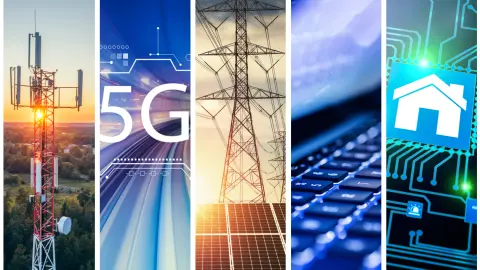Lower energy prices provide a tailwind for telecom operators
Telecom operators face a brighter financial outlook in 2024. Last year, many felt the impact of higher energy prices, which they had largely hedged at high levels in 2022, to guarantee supply. As energy prices have since come down, the declining costs of energy could provide some tailwind to margins
The effect of higher energy prices on telecoms
Providing the infrastructure for phone calls, online gaming, and video conferencing is an energy-intensive business. It is no surprise, then, that the telecoms sector accounts for roughly 2% of global energy consumption. Because energy is an important cost component for telecoms, they were mostly (roughly 90%) hedged when energy prices shot up in 2022 and early 2023. However, hedging in 2022 was more expensive than in previous years. Moreover, energy prices in Europe are likely to remain above their levels before the war in Ukraine.
Historically, the price of wholesale electricity has been roughly €40/MWh. Electricity, in turn, is often generated from natural gas, which has historically been priced around €20/MWh. As you can see below, gas prices have come down and have stabilised since their peak in 2022. This means that telecom operators will feel the tailwind of lower energy prices in 2024 compared to 2023. Gas prices are chosen because regional electricity markets in Europe all have their own characteristics, while European gas markets are deep and better reflect price trends.
Gas prices have declined since 2022’s peak
3-month forward gas price in euros per megawatt hour (expected prices in orange)

Telecoms’ financial outlook is positive despite margin pressures
The rise in energy costs placed upward pressure on many telecoms cost bases in 2023. Rising wages also played a part; as the cost of living increased strongly, so too did wages. Yet, in this challenging environment, most telecoms have managed to increase revenue through somewhat higher prices. Cost efficiency measures countered part of the cost increase. These two measures combined mitigated inflationary pressures for telecoms.
For 2024, the financial outlook of telecoms is more positive. The headwinds from energy costs and wage increases will likely ease. Furthermore, many telecoms will continue to cut costs, for example through the decommissioning of their copper networks. This leaves open the possibility for increased profitability in 2024.
Telecoms have procured a lot of sustainable energy, but 5G could offer challenges
The telecom sector also procures a very significant amount of green energy. So much so that, according to a report by Oliver Wyman, telecom operators are ahead of plan in greening their operations. On average, telecom operators use 11% more sustainable energy than other companies in countries where they are located. In procuring a substantial amount of green energy, telecoms further hedge themselves from higher energy prices.
Tele2, Telia and Deutsche Telekom are leading the sustainability charge. They managed to cut their Scope 1 and 2 emissions between 2016 and 2021 by 99, 96, and 93%, respectively. They, and other telecoms, made their businesses more sustainable through the procurement of sustainable energy. In addition, they decommissioned copper networks and moved to much more energy-efficient fibre networks.
However, the 5G rollout could offer challenges. 5G requires more cell towers than 4G to offer higher speeds, meaning the network likely requires somewhat more energy. There might be smart ways to offset possible higher energy use of 5G, and telecoms will likely procure enough sustainable energy. Moreover, telecoms have managed to make their Scope 1 and 2 emissions sustainable with remarkable speed. However, Scope 3 emissions are roughly 70% of telecoms’ supply chain emissions. This stems mostly from the manufacturers of networks, networking equipment and the supply of products such as mobile phones.
Given the fact that the telecom sector is making important strides in the green transition, we expect them to face these challenges head on while the volatility of energy prices should recede compared to 2022.
Download
Download article
1 February 2024
Telecoms Outlook 2024: Stepping into the future This bundle contains {bundle_entries}{/bundle_entries} articlesThis publication has been prepared by ING solely for information purposes irrespective of a particular user's means, financial situation or investment objectives. The information does not constitute investment recommendation, and nor is it investment, legal or tax advice or an offer or solicitation to purchase or sell any financial instrument. Read more

